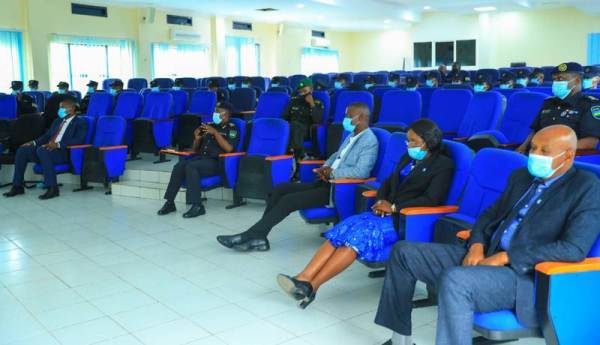
Twenty-five Police officers, on Monday, May 24, started a five-day training on ‘prevention of recruitment and use of children as soldier in armed conflict’ at the National Police College (NPC) in Musanze District.
The Deputy Inspector General of Police (DIGP) in charge of Administration and Finance, Jeanne Chantal Ujeneza, presided over the official launch of the Training of Trainers (ToT) course, which was organized and conducted by Rwanda National Police in partnership with the Dallaire Institute for Children, Peace and Security.
The event was also attended by the Germany Deputy Head of Mission in Rwanda, Renate Charlotte Lehner.
Gen (rtd) Romeo Dallaire is a Canadian, who commanded the UN peacekeeping force that was deployed in Rwanda during the 1994 Genocide against the Tutsi.
DIGP Ujeneza observed that protection of children against any form of violence and abuse is the responsibility that should be upheld by all adult people especially human rights duty-bearers such as the Police.
“It is an obligation that Rwanda, as a member state of the UN and Rwanda National Police in particular, as a professional institution, take at heart. While Rwanda enjoys substantial peace, security, and stability, we recognize, however, that there are other places in the world and on the continent where people are still experiencing violent conflicts and where most victims are civilians and mostly children,” DIGP Ujeneza said.
She noted that Rwanda being a major troop and Police contributor to the UN peace support operations and being among the UN member states which endorsed the Vancouver principles on peacekeeping and prevention of recruitment and use of children as soldiers by armed forces and armed groups; the government through its institutions such as RNP, uphold and commit to comply with the same principles for the respect of human rights and ensuring protection of civilians in areas of violent conflicts.
“Children being the most vulnerable civilians in the period of insecurity and in the aftermath of violent conflict, need to be considered for protection against any form of violence or any abuse.
To effectively prevent the recruitment and use of children as soldiers in areas of violent conflict, there is need to equip peacekeepers with deep understanding on the issue and realities on the ground.”
Future Rwandan police peacekeepers, she said, shall be equipped with appropriate skills to handle the issue in a sustainable manner.
She urged the trainees to take the ToT course seriously. “You have been selected to attend this training… after you get knowledge and deep understanding of this issue of use of children as soldiers and knowing how to effectively detect and prevent it; you will share the knowledge with the future RNP peacekeepers to create impact in all our areas of operation domestically and abroad where they will be deployed.”
The training, DIGP Ujeneza said, solidifies the foundation for further trainings for RNP personnel in this relevant domain, which she said will be included in the force’s training curriculum, especially the peace support operation pre-deployment training.
The Germany Deputy Head of Mission in Rwanda, Renate Charlotte Lehner, said that soldiers and police officers today undertake special training on how to intervene at an early stage if children are forcibly recruited in a conflict.
“You will acquire skills on how to disarm and protect child soldiers so that the children are not alone – they will have a safety net because of you. We trust and believe in the capacity of the Rwandan trained UN soldiers and police staff; they are recognized peacekeepers on the African continent and elsewhere,” Renate said. (End)
